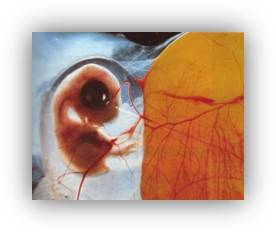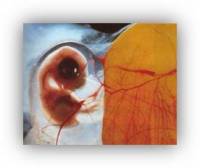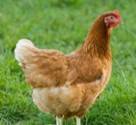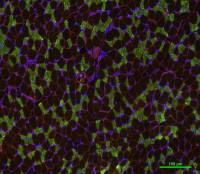The work of this team aims to improve knowledge of the mechanisms regulating growth and metabolism to control the development of poultry, their body composition, and meat quality and improve their ability to adapt to farming conditions (including climate variations).
Team leaders: Sonia Métayer-Coustard and Sophie Tesseraud
General objectives:
The objectives of the MOQA team are to preserve the health and well-being of the animals by strengthening their robustness, to control the nutritional, technological, sensory and sanitary qualities of the meat, and to seek compromises between adaptive and productive functions for sustainable and ethical poultry farming. In order to respond to this, we rely on our complementary scientific expertise, which enables us to combine mechanistic approaches with the design and evaluation of new breeding strategies. Our work focuses on understanding the mechanisms controlling the animal's adaptation and production capacities, the optimal metabolic use of resources, muscle biology and meat quality. Our approach consists of 1) evaluating the adaptive capacities of poultry and the quality of their meat using indicators and biomarkers, if possible non-invasive, 2) understanding physiological and metabolic regulations by integrating the different stages of the animal's life, the programming of phenotypes and their transmission, and 3) acting by proposing innovative tools and practices for selection and rearing.
Research Topics:
| - Strengthening the robustness of the young animal to preserve its health, well-being and development In order to improve the robustness of the chicken, our work aims to understand the effect of early conditions, including in ovo, on chick physiology, metabolic regulation and associated cellular and epigenetic mechanisms, and to identify potential levers for improvement. Our work focuses in particular on the impact of perinatal nutrition, the energy status of female breeders (linked to their diet or genetics), incubation conditions (temperature, gas) and the start-up of rearing on the metabolism, robustness and health of chicks, with a focus on metabolic programming. |
| - Contribute to more ethical experimentation, rearing and selection practices that are favorable to animal welfare With the aim of promoting animal welfare and raising poultry while reducing the use of medicinal inputs, we are developing approaches to propose innovative practices and define more ethical breeding and selection strategies that meet societal demand for access to the outdoors for farm animals. To this end, we are identifying minimally or non-invasive biomarkers of metabolism, redox status and inflammation, which we use in a phenotyping approach in livestock farming. We are particularly interested in new on-farm hatching practices, the exploratory behaviour of chickens, the self-medication capacities of poultry, based on natural plant extracts in particular, and the multi-criteria characterisation of dual-purpose strains as an alternative to the elimination of male chicks from laying strains. |
| - Understand the mechanisms of meat quality and evaluate the impact of changes in practices The context of diversification of production methods and the multiple expectations of product quality require an understanding of the mechanisms of meat quality development and the impact of changing practices. We are particularly interested in the molecular mechanisms that control energy metabolism and muscle cell renewal, two major determinants of poultry meat quality. Our work also integrates the development of innovative tools for minimally or non-invasive phenotyping and multi-criteria analysis, taking into account the different facets of product quality (nutritional, sanitary, sensory and technological) but also the elements of sustainability of production systems (environmental impact, animal welfare in particular). |
Ongoing projects:
- CASDAR Connaissances FranceAgriMer PRESAJE, 2023-2026 : Repenser la nutrition PRotéique avec des aliments diversifiés et digestibles pour la SAnté, le bien-être et la robustesse du JEune poussin.
- Projet européen H2020 INTAQT, 2021-2026 : INnovative Tools for Assessment and Authentication of chicken meat, beef and dairy products’ QualiTies.
- Projet européen H2020 PPILOW, 2019-2024 : Poultry and PIg Low-input and Organic production systems’ Welfare.
- Projet France Futur Elevage (F2E) ChickBoom, 2019-2023 : An innovative farming system in poultry: On-farm hatching to improve multi-performance.
- CASDAR/RT CHICK’TIP, 2018-2022 : Chick’Tip : Un monitoring précoce de la qualité des poussins pour une production avicole plus durable.
- Projet d’Investissement d’Avenir SAGA, 2017-2022 : Without antibiotics thanks to algae.
Major publications:
Bonnefous C., Calandreau L., Le Bihan-Duval E., Ferreira V.H.B., Barbin A., Collin A., Reverchon M., Germain K., Ravon L., Kruger N., Mignon-Grasteau S., Guesdon V. (2023). Behavioural indicators of range use in four broiler strains. Applied Animal Behaviour Science, 260, 105870, doi.org/10.1016/j.applanim.2023.105870.
Coudert E., Baeza E., Chartrin P., Jimenez J., Cailleau-Audouin E., Bordeau T., Berri C. (2023). Slow and fast-growing chickens use different antioxidant pathways to maintain their redox balance during postnatal growth. Animals, 13, 1160, 18 p.
Fortun-Lamothe L., Collin A., Combes S., Ferchaud S., Germain K., Guilloteau L., Gunia M., Lefloc’h N., Manoli C., Montagne L., Savietto D. (2023). Principes, cadre d’analyse et leviers d’action à l’échelle de l’élevage pour une gestion intégrée de la santé chez les animaux monogastriques. INRAE Productions Animales, 35(4), 307–326. doi.org/10.20870/productions-animales.2022.35.4.7225
Beauclercq S., Mignon-Grasteau S., Petit A., Berger Q., Lefèvre A., Métayer-Coustard S., Tesseraud S., Emond P., Berri C., Le Bihan-Duval E. (2022). A Divergent Selection on Breast Meat Ultimate pH, a Key Factor for Chicken Meat Quality, is Associated With Different Circulating Lipid Profiles. Front Physiol. 13:935868. doi: 10.3389/fphys.2022.935868. PMID: 35812337; PMCID: PMC9257005.
Bonnefous C., Collin A., Guilloteau L.A., Guesdon V., Filliat C., Réhault-Godbert S., Rodenburg T.B., Tuyttens F.A.M., Warin L., Steenfeldt S., Baldinger L., Re M., Ponzio R., Zuliani A., Venezia P., Väre M., Parrott P., Walley K., Niemi J.K., Leterrier C. (2022). Welfare issues and potential solutions for laying hens in free range and organic production systems: A review based on literature and interviews. Front Vet Sci. 9:952922. doi: 10.3389/fvets.2022.952922. eCollection 2022.
Durand D., Collin A., Merlot E., Baéza E., Guilloteau L.A., Le Floc'h N., Thomas A., Fontagné-Dicharry S., Gondret F. (2022). Review: Implication of redox imbalance in animal health and performance at critical periods, insights from different farm species. Animal. 2022;16(6):100543. doi: 10.1016/j.animal.2022.100543. Epub 2022.
Guinebretière M., Puterflam J., Keïta A., Réhault-Godbert S., Thomas R., Chartrin P., Cailleau-Audouin E., Coudert E., Collin A. (2022). Storage Temperature or Thermal Treatments During Long Egg Storage Duration Influences Hatching Performance and Chick Quality. Front Physiol. 13:852733. doi: 10.3389/fphys.2022.852733. eCollection 2022.
Petit A., Réhault-Godbert S., Nadal-Desbarats L., Cailleau-Audouin E., Chartrin P., Raynaud E., Jimenez J., Tesseraud S., Berri C., Le Bihan-Duval E., Métayer-Coustard S. (2022). Nutrient sources differ in the fertilised eggs of two divergent broiler lines selected for meat ultimate pH. Sci Rep. 12(1):5533. doi: 10.1038/s41598-022-09509-x. PMID: 35365762; PMCID: PMC8975873.
Métayer-Coustard S., Tesseraud S., Praud C., Royer D., Bordeau T., Coudert E., Cailleau-Audouin E., Godet E., Delaveau J., Le Bihan-Duval E., Berri C. (2021). Early Growth and Protein-Energy Metabolism in Chicken Lines Divergently Selected on Ultimate pH. Front Physiol. 12:643580. doi: 10.3389/fphys.2021.643580. PMID: 33746779; PMCID: PMC7969813.
Praud C., Pampouille E., Le Bihan-Duval E., Berri C. (2021). Refining the Diagnosis of Growth-Related Muscle Abnormalities in Chickens Based on the Nomenclature Used to Characterise Human Myopathies. Front Physiol. 12:745031. doi: 10.3389/fphys.2021.745031. PMID: 34790133; PMCID: PMC8592233.
Tesseraud S., Avril P., Bonnet M., Bonnieu A., Cassar-Malek I., Chabi B., Dessauge F., Gabillard J.C., Perruchot M.H., Seiliez I. (2021) Autophagy in farm animals: current knowledge and future challenges. Autophagy 17(8):1809-1827. doi: 10.1080/15548627.2020.1798064.
Travel A., Petit A., Barat P., Collin A., Bourrier-Clairat C., Pertusa M., Skiba F., Crochet S., Cailleau-Audouin E., Chartrin P., Guillory V., Bellenot D., Guabiraba R., Guilloteau L.A. (2021). Methodologies to assess the bioactivity of an herbal extract on immunity, health, welfare and production performance in the chicken: The case of Melissa officinalis L. extract. Frontiers in Veterinary Science, Frontiers Media, 2021, 8, 17 p. ⟨10.3389/fvets.2021.759456⟩. ⟨hal-03468715⟩
Vitorino Carvalho A., Hennequet-Antier C., Brionne A., Crochet S., Jimenez J, Couroussé N., Collin A., Coustham V. (2021). Embryonic thermal manipulation impacts the postnatal transcriptome response of heat-challenged Japanese quails. BMC Genomics, BioMed Central, 2021, 22 (488), ⟨10.1186/s12864-021-07832-7⟩. ⟨hal-03321946⟩
Baeza E., Lessire M., Chartrin P., Juin H., Meteau K., Guillevic M., Chesneau G. (2020). Qualitative market segmentation of broiler grillers by using alternative proteins to soybeans and lipid sources in feeding programmes. Bristish Poultry Science, 62 (2), 261-269.
Nyuiadzi D., Berri C., Dusart L., Travel A., Méda B., Bouvarel I., Guilloteau L.A., Chartrin P., Coustham V., Praud C., Le Bihan-Duval E., Tona J.K., Collin A. (2020). Short cold exposures during incubation and postnatal cold temperature affect performance, breast meat quality, and welfare parameters in broiler chickens. Poultry Science, Poultry Science Association, 99 (2), pp.857-868. ⟨10.1016/j.psj.2019.10.024⟩. ⟨hal-02911075⟩






